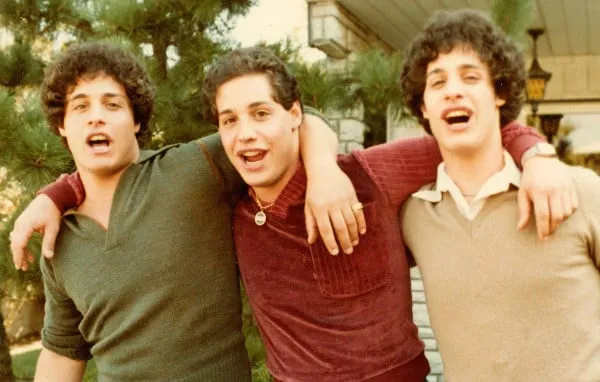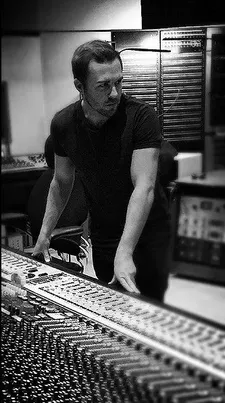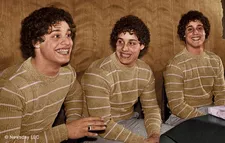 |
| Eddy, David and Bobby. Paul Saunderson: 'I wanted to make it organic and strings always prolong and help with emotion. Photo: Courtesy of CNN Films/Raw |
Tim Wardle's documentary Three Identical Strangers takes viewers on a gripping and surprising journey into the lives of Bobby Shafran, Edward Galland and David Kellman - triplets who didn't discover they had siblings until an accidental encounter at college. As the film progresses it explores the way that the young men were thrust into the media spotlight before taking a darker turn as they begin to learn the shocking reason why they were split up in the first place.
It's a film that has a wealth of music supporting it, both in current day recollections and reconstructions of the past and I caught up with British composer Paul Saunderson to talk about it at Sundance, where the film had its premiere.
How does writing music for a documentary, particularly here, where you’re fitting round pop music cues as well, compare to composing for fiction films like The Marker?
 |
| Composer Paul Saunderson Photo: paulsaunderson.com |
You mention a motif idea, there’s quite a lot of string use running through this, was that something that you decided early on?
I worked with an orchestra on this project called the London Contemporary Orchestra. They specialise in pushing the boat out there and creating interesting textures. I wanted to create a really organic score and not be reliant on synths too much. The middle cue in the film has a sort of violin, virtuosic moment, because it’s all about nurture versus nature, they were just really keen on having the idea of a trio – I had two cellos and a violin, so it’s a weird string trio. But I wanted to make it organic and strings always prolong and help with emotion. It just brings a human feel rather than just having synths. There’s piano, that I play, and a lot of string textural music. Moving textures instead of doing what I used to call ‘posh drones’. I prefer to do something more than that, which moves and evolves.
It has an almost ‘newsy’ feel in places, as though you’re trying to keep the pace going.
The part of the film where we cut to more the ‘case study’ part of it, we cut to more electronic pulse elements. Tim wanted to have clear, defined areas – because there’s lots of flashbacks – so he wanted the current day elements to feel ‘modern’. Then when we looked back, for instance with Louise Wise Services, he wanted to have a kind of almost retro feel. He was talking about films like Basic Instinct and other films from the Eighties. We also thought about Bernard Herrmann because there’s a big reveal and things spiral out of control. But it’s quite traditional in that sense but it has a nostalgic feel. So, towards the end, you always want to inject pace.
Do you view a limited orchestra as a challenge or a limitation that drives you spare?
It’s a challenge and limitation is the correct word, but it’s limitation in a good way. It makes you strict, so you think, ‘These are the instruments I want to write for and this is the collection of sounds’, and you write for that band, you stick to it. It kind of helps to keep the score more concise and narrows the guidelines of what you’re doing. There are some times, especially if they’ve thrown up some huge orchestral cue, and you think, ‘Well, I’m not sure how we’re going to do that’, but then I kind of say, we’re doing it differently. There’s a small collection of instruments but I think you can still achieve a very cinematic and grand feel. I think it just makes it a little bit more direct.
How did you come into composing for films in the first place?
 |
| Bobby, David and Eddy. Paul Saunderson: 'There’s a small collection of instruments but I think you can still achieve a very cinematic and grand feel' Photo: Newsday LLC |
I studied music at Leeds University and I persevered, met like-minded people and started interning for a composer, Ilan Eshkeri. He’s like my mentor and my best friend. I started working with him eight or nine years ago and you learn the trade and the art of scoring for film. Every project is different, so this, for example, I didn’t get it right first time by any means. Some of the versions were version 15 of a cue. But working under a composer gave me great opportunities and you learn the craft.
What did you think when you first saw the details of the film?
I was surprised by the amount of music because it’s virtually wall to wall, which is not so common. For a nature documentary, yes, but with a documentary like this you wouldn’t have thought it. But this was a really fun experience. I love documentaries and I love to watch them in my spare time. I think it’s parallel to narrative, especially with all the reconstruction. I try to approach it how I would approach writing a film score for a drama rather than writing 20 different pieces of music that don’t correlate. But I’m keen to work on more documentaries. I’m about to start a project called Clean Break, which is an ITV six-part drama with Sheridan Smith. I’m working with Guy Garvey, from Elbow, and the bassist from a band called I Am Kloot, Peter Jobson.
Do you enjoy the collaboration?
It can be quite a solitary life sometimes writing in a studio by yourself, just you and your thoughts and your music, thinking, ‘Am I doing the right thing?’. So collaborating is a really great way to, I guess, let go. Three different ideas – so it makes the process fun. If you relax into, what you come out with is something you wouldn’t have been able to achieve by yourself because it’s a collective of three minds. Especially with people like Pete and Guy who have been in bands for years. It’s a nice change from writing alone and, if a collaboration works and you all get on, it’s good to maintain that.
For more about Paul's work, visit his website.





















